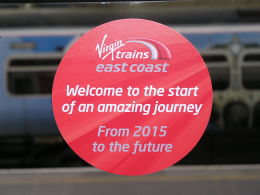Posted 17th July 2018 | 4 Comments
DfT admits it had doubts about East Coast revenue targets

THE bid for the Intercity East Coast franchise which was won by Stagecoach and Virgin was ‘quite ambitious’, a committee of MPs has been told. It has emerged that the Department for Transport did not expect the business plan to succeed in full.
The Commons Transport Committee has been taking evidence for its inquiry into the failure of the Virgin Trains East Coast franchise, which began at the start of March 2015 and ended on 24 June this year.
Stagecoach Group owned 90 per cent of the business and lost some £200 million in the collapse, which has been attributed to revenues being lower than forecast. It has been claimed that delayed Network Rail infrastructure upgrades were a contributory factor.
The total premiums at net present value in 2015 would have £2.3 billion, or £3.3 billion when inflation was taken into account between then and the original termination date in 2023.
The award of the franchise was a flagship event because it marked the end of six years of public control of East Coast, which began when the previous National Express franchise failed in 2009.
The DfT’s director of passenger services Simon Smith was one of the officials who gave evidence to the Committee. He said: “We thought Virgin Stagecoach’s bid was quite ambitious a the time we received it. We expected at the time that we evaluated their bid that revenue would be lower than they forecast.
“They had attributed quite ambitious growth to certain initiatives including things like their marketing and pricing strategy, and so on. We thought they would get some of that but we didn’t think they would get all of that.”
His colleague, Rail Group director general Polly Payne, added: “We want ambitious bids because they maximise the revenue we get for the taxpayer but we also want to ensure that if things don’t work out as we and the franchisee hope then we make sure both passengers and taxpayers are looked after.”
The DfT has insisted that taxpayers did not lose, because the contracted premiums were paid in full while the Virgin Trains East Coast franchise lasted.
The new arrangement of effective renationalisation on the route is set to continue until 2020, when the DfT intends to replace it with a new style of contract involving Network Rail, to be known as the East Coast Partnership.
Reader Comments:
Views expressed in submitted comments are that of the author, and not necessarily shared by Railnews.

Tony Pearce, READING
Thank you for your Comment about DfT creaming off excess profits, - I didn't know that. Does the other way apply as well ? Do the DfT stump up more and more money should the fares be less than predicted ?
[Yes, but not at first. The mechanism, known as revenue support, usually only starts to apply after four years. Hence there could be no rescue for Virgin Trains East Coast (if revenue support is still being applied to new franchises). For more, see www.railhub2.co.uk/rh7/revealed/rai_article.php?doc=16072360--Editor.]
Tony Pearce, READING
How can anyone predict Passenger numbers (and therefore the Revenue collected from Ticket Sales) until 2023 ? Too little and we have huge profits for the Operator; - too little and we have huge losses. A better system needs to be devised that rewards effort, investment and enterprise by the Operators but not the lottery that exists at the moment.
[The DfT does take a progressively greater slice of revenues that are greater than predicted. In some contracts the highest band has been 100%.--Editor.]
Lee, Manchester
I can in no way claim to be an expert in rail franchising, but having read the above article, as a lay man, I do ask myself why the DfT awarded the ECML contract to Stagecoach Virgin if they didn't think the company was capable of realising its business plan in full.
To my simplistic mind, either the business plan was overly optimistic or it was based on information relating to infrastructure schemes, which was similarly optimistic or both of these.
It is good that the taxpayer doesn't lose out, but it does raise the question how many companies/consortiums will bid for franchises like this in the future, particularly if the franchise, like the ECML, is prone to financial failure?
Perhaps an overhaul of the franchise marking system is required where 'ambitious bids' are looked at with a more pragmatic and realistic rather than aspirational mind-set?
Chris Jones-Bridger, Buckley
Disturbing that the revenue targets were expected to fail especially after previous franchise failures. Be interesting now to revisit the other competing bids to see if they would have survived.
Also how much political pressure was exerted on DfT Officials to return the franchise to a private operator at all costs?